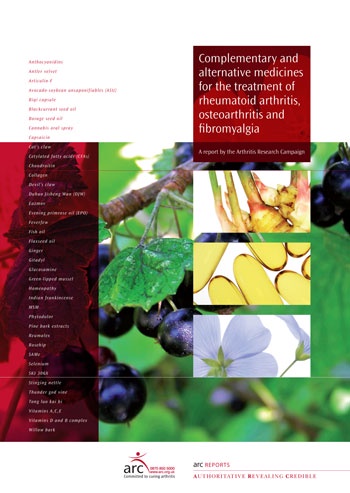Today, the Arthritis Research Campaign (arc) launches the first evidence-based report dedicated to the use of complementary medicines in arthritis using results from randomised controlled trials.
Complementary and alternative medicines for the treatment of rheumatoid arthritis,
osteoarthritis and fibromyalgia is a summary of existing published studies which
indicates whether or not there is scientific evidence to support the clinical
effectiveness and safety of certain named products for people with arthritis.
Despite the number of complementary and alternative medicines on the market, the
report found that evidence from randomised controlled trials was available for only
40 of them.
There are considerable variations in the level of scientific data to support
the effectiveness of such medicines. For nearly two thirds of compounds used for
rheumatoid arthritis (RA) (the most common inflammatory arthritis) the available data
suggest they are not effective, while the effectiveness of glucosamine, a supplement
popular with people with osteoarthritis (OA) is again called into question.
Effectiveness is measured by improvements in pain, movement or general well-being.
The report says:
For rheumatoid arthritis (RA):
- Nearly two thirds (13 out of 21 complementary medicines [62 per cent]) were
shown to have no or little effect based on the available evidence (scoring 1
out of 5 on the effectiveness scale)
- The 13 are: antler velvet; blackcurrant seed oil; collagen; eazmov herbal
preparation; feverfew; flaxseed oil; green-lipped mussels; homeopathy;
reumalex herbal mixture; selenium; Chinese herb tong luo kai bi; vitamins A,C
and E anti-oxidant vitamins; and willow bark.
- By contrast fish body oil scored 5 out of 5 for people with RA, reducing joint
pain and stiffness.
For osteoarthritis (OA):
- Nearly one fifth (6 out of 27 medicines [22 per cent]) were shown to have little
or no effect based on the available evidence
- Glucosamine one of the most widely taken products showed mixed results
with glucosamine sulphate scoring 3 and glucosamine hydrochloride scoring 1
- Capsaicin gel, made from chilli peppers, proved most effective in relieving
pain and joint tenderness, scoring the full 5.
For fibromyalgia:
- Only four products were assessed
- None of them highly effective with three medicines scoring 2 out of 5, and the
fourth an ineffective 1.
Safety:
- One quarter of the compounds were given an "amber" safety classification
indicating there were important side-effects which had been reported,
although there is much less safety information available for complementary
medicines in comparison to conventional medicines.
- Only one "red" safety classification was issued against thunder god vine for
RA.
Gary Macfarlane, Professor of Epidemiology at the University of Aberdeen, who led the research, said it was important that people with arthritis had some guidance on the complementary medicines available.
"While over 60 per cent of people with arthritis or other aches and pains use some form of
complementary and alternative medicine - and find different things work for them - it
is useful to also have the scientific evidence available and just as important to know
how safe we think they are to use," said Professor Macfarlane. "All of the evidence
can now be accessed in this definitive report."
Forty-six per cent of people in the UK use complementary medicine at some point in
their lives for a wide range of conditions, spending over £450 million a year on
products and treatment outside conventional therapy.
The report, the first of its kind dedicated to arthritis, has been produced to help people make up their minds about products for which claims have been made but in many cases are unsubstantiated by hard evidence.
Professor Alan Silman, the Arthritis Research Campaign's medical director, explained:
"Complementary medicines are widely used by people with arthritis as they seek to
avoid taking potentially harmful drugs, preferring natural products. However, natural
does not mean they are either safe –or effective. Many people spend hundreds of
pounds on these products and they need to know that there is a strong chance of
benefit."
The report covers medicines taken by mouth or applied to the skin, rather than
therapies such as acupuncture and chiropractic. It scores medicines according to
their effectiveness with 1 indicating that the available evidence suggests that the
compound is not effective and 5 indicating that the compound is effective. It also
grades the medicines according to safety, providing traffic light classifications for
each.
Copies of the report are available on 01904 696994 or arc@bradshawsdirect.co.uk</p>
The report is also available as a free PDF download at www.arc.org.uk


